Lyle Lovett: A Man and His Band
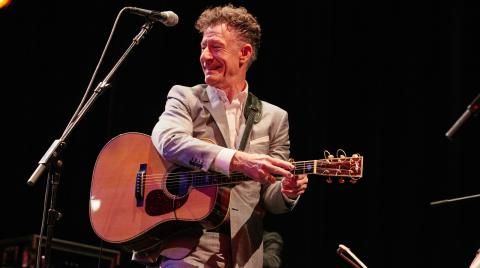
Lyle Lovett
Photo by Dave Green
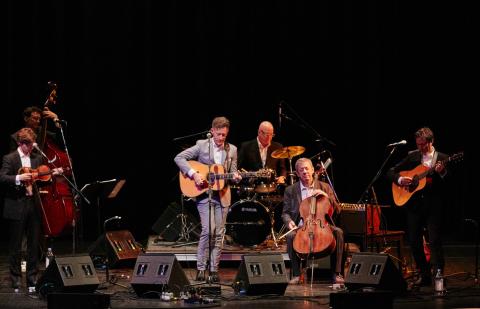
From left: bassist Viktor Krauss, fiddler Warren hood, Lovett, drummer Russ Kunkel, cellist John Hagen, and guitarist Keith Sewell
Photo by Dave Green
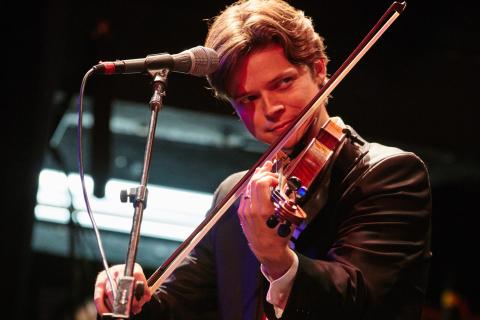
Warren Hood '04 says one of the fiddlers he most admires is Stuart Duncan, who has recorded with Lovett several times since the mid-1990s.
Photo by Dave Green
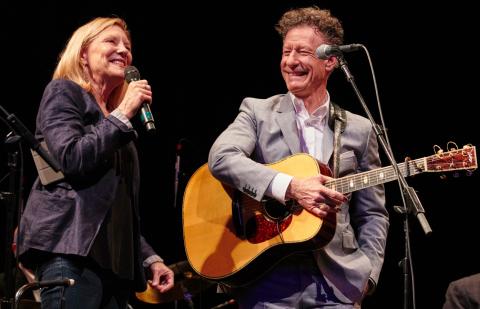
Songwriting chair Bonnie Hayes and Lyle Lovett
Photo by Dave Green
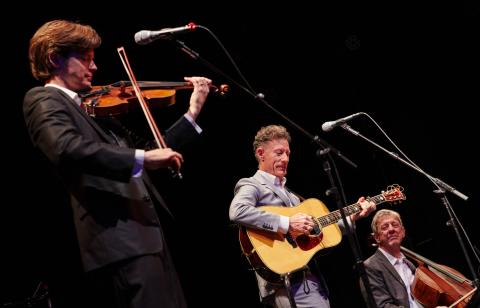
From left: Warren Hood, Lyle Lovett, and John Hagen. Hagen has been performing with Lovett since 1979.
Photo by Dave Green
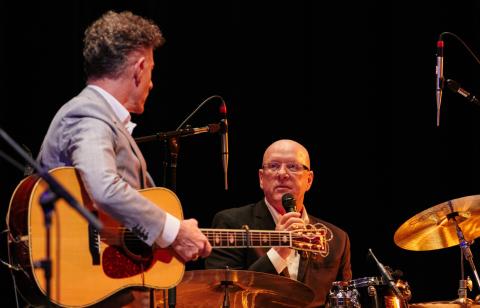
Speaking to Berklee students, drummer Russ Kunkel mentioned that his son Nathaniel, a recording engineer, has previously visited the college to present studio clinics.
Photo by Dave Green
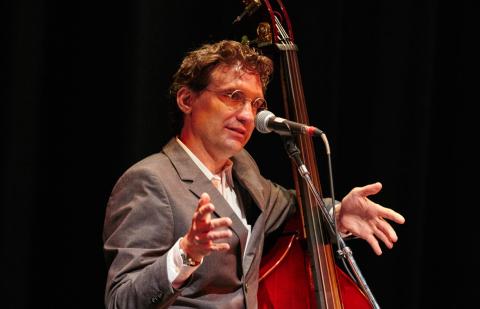
While bassist Viktor Krauss was in town with Lovett, he also taught at the Berklee Roots Weekend.
Photo by Dave Green
Humility. That's the word that comes to mind after witnessing Lyle Lovett's appearance at Berklee in late June. The Texas-born singer-songwriter spent an hour performing and answering students' questions, and despite the fact that he has released more than a dozen acclaimed albums, won four Grammy Awards, and acted in several popular films and television shows, he made it all about everyone except him.
Mostly, he put the focus on the musicians who accompanied him throughout the afternoon clinic.
"There's not a greater thrill than getting to play with people who are really talented," said Lovett. "My very first rule of trying to put a band together...was always to make sure I'm absolutely the worst player and singer in the band."
Whether or not that's true in the case of the Berklee clinic, Lovett's band is an impressive one:
- Russ Kunkel, drums (James Taylor, B.B. King)
- Viktor Krauss, bass (Bill Frisell, Allison Krauss)
- Keith Sewell, guitar (Earl Scruggs, Dixie Chicks)
- John Hagen, cello (Chieftains, Robert Earl Keen Jr.)
- Warren Hood, fiddle (Emmylou Harris, Elvis Costello)
The message seemed to resonate with the Berklee Performance Center crowd, consisting primarily of students in two summer programs: the Berklee Roots Weekend and Vocal Summit students. After one student asked how his band came together, Lovett mentioned the importance of compatibility.
"When you think about bands that you like [to play with], you think about people you like to hang out with," said Lovett. "A lot of the great bands seem to be made up of people who started out wanting to spend time around one another. Certain people you meet in your life bring out the best in you. And you can have that affect on them as well."
After Lovett and his group played "Cowboy Man," a student asked Hood—an Austin, Texas native who studied at Berklee in 2003 and 2004—about creating fiddle licks to accompany Lovett.
"I try to think about listening to the vocals as much as listening to yourself and don’t play when he’s singing," said Hood. "Always work off the melody if you can. If he’s going to wind up on the root, play the third and the fifth. You’re just trying to make him sound better and not call attention to yourself. My favorite players are the ones you don’t even notice most of the time. They’re just doing what needs to be done when it needed to happen."
When Lovett was a college student at Texas A&M, he majored in journalism and German, but he began learning about the music business by booking concerts at the student union and interviewing musicians, such as Nanci Griffith, for the school newspaper. Eventually, he began "making up" songs and booking $50-a-night gigs for himself in small Texas clubs.
The clinic moderator, Bonnie Hayes, Berklee's songwriting chair, asked Lovett how he generates ideas for his original music.
"Songs happen in all kinds of ways. Sometimes you'll get a melody in your mind and sometimes a phrase or even just a word keeps bothering you," Lovett said. "What's consistent for me about writing is that a song happens if an idea is trying to impose itself on you, or you just can't stop thinking about it."
Hayes asked about the source of Lovett's eclecticism; though originally seen as a country artist, Lovett makes music that ranges from blues and R&B to big band swing and pop.
"Music has to support the lyrical ideas. Some lyrics are better supported by one sound or another," he said.
The clinic ended with Lovett and the band performing "She's No Lady," a song that Hayes cited as a good example of one containing a typically understated Lovett lyric.
In an era when some of the most popular music and entertainment personalities are defined by self-celebrating bombast, Lovett provided a transfixing counterpoint. As Lovett demonstrates, understated lyrics, a quiet stage presence, and great songs are all you really need to make people stand up and cheer.